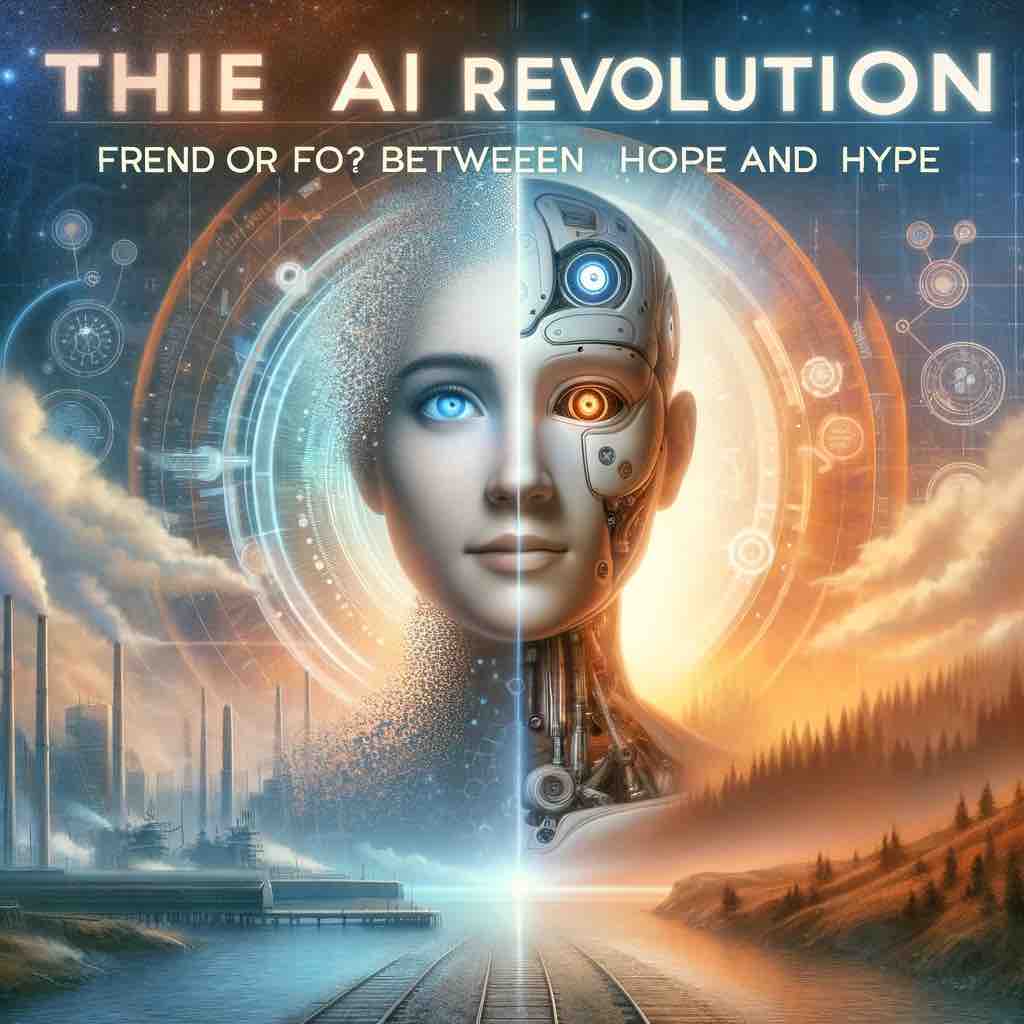The AI Revolution: Friend or Foe?
The air crackles with anticipation, not from a storm but from the rapid advance of an unseen force: artificial intelligence (AI). Once confined to the realm of science fiction, AI is now bleeding into our everyday lives, from personalized Netflix recommendations to self-driving cars navigating city streets. This technological upheaval dubbed the “AI Revolution,” promises an unimaginable future even a decade ago. But amidst the excitement, a whisper of unease echoes through the corridors of society. As AI rapidly evolves, a crucial question arises: is it a benevolent partner propelling us toward a brighter future or a lurking foe harboring unforeseen dangers? The debate on whether artificial intelligence (AI) is a friend or a foe has been extensively discussed. The potential of AI to revolutionize various aspects of society has been a subject of hope and concern. Several key points have emerged from this debate.
Let’s embark on a journey through the kaleidoscope of possibilities unleashed by AI. In healthcare, AI-powered algorithms analyze medical scans with superhuman precision, flag anomalies to doctors, and even predict disease outbreaks. Imagine a world where AI guides surgeons, personalizes treatment plans and develops life-saving drugs at an unprecedented pace. The potential to save lives and alleviate suffering is genuinely astounding.
Ethical Implications of AI
The ethical implications of AI have been a significant point of discussion. It is essential to consider the impact of AI on labor structures employment and its potential to disrupt industries. Ethical landmines lie hidden throughout this landscape. Who will be responsible when an AI misdiagnoses a patient, leading to devastating consequences? Will access to these cutting-edge technologies exacerbate existing inequalities in healthcare, leaving disadvantaged communities further behind? These complex questions demand careful consideration and proactive policies to ensure equitable access and prevent discrimination.
Turning our gaze to the world of finance, AI algorithms are already making waves, analyzing market trends, and managing investments with uncanny accuracy. Imagine a future where AI advisors help individuals tailor their investments, democratize financial expertise, and even predict economic crashes before they happen. The potential for economic growth and stability is undeniable. However, financial manipulation and algorithmic bias lurk in the shadows. As AI’s influence on financial markets deepens, concerns about insider trading, market manipulation, and wealth inequality exacerbate. Who monitors and regulates these powerful algorithms to ensure fairness and prevent unforeseen financial crises? Navigating this treacherous terrain requires robust regulatory frameworks and continuous vigilance to safeguard the financial system’s integrity.
Government, Industry, and People
The balance between government, industry, and the public in the development and use of AI has been emphasized. Ongoing conversations around the ethics of AI and its evolving usage are crucial in shaping its impact. Beyond healthcare and finance, AI’s tentacles are reaching into the very fabric of society. Automation fueled by AI is poised to transform the workforce, potentially replacing humans in many jobs. While some envision a future of leisure and creative pursuits, others fear widespread unemployment and social unrest. The question then becomes: how do we adapt our education systems and social safety nets to ensure everyone thrives in this rapidly changing landscape? Will AI create a utopia of human potential or a dystopia of mass unemployment and social disparity? The answer lies in our choices our proactive response to the challenges and opportunities AI presents. Stepping into the realm of creativity, AI paints with a digital brush, composing music, writing novels, and even generating art indistinguishable from human creations. Some fear the death of human creativity, a future where machines churn out art devoid of soul. Others, however, see a fertile ground for collaboration, where AI tools act as muses, amplifying human creativity and birthing novel forms of artistic expression. The future of art in this AI-infused world lies not in competition but in a delicate dance between man and machine, where technology unlocks new pathways for human expression.
Several potential scenarios emerge as we peer into the crystal ball of the future. In one, AI seamlessly integrates into our lives, enhancing our capabilities and solving global challenges. We become partners with intelligent machines, working together to create a more prosperous and equitable world. In another, AI’s unchecked advancements lead to mass unemployment, technological dependence, and even existential threats. We become mere cogs in a machine-driven world, and our autonomy eroded, and our humanity diminished.
The ultimate trajectory of the AI revolution still needs to be addressed. Whether it becomes a friend or foe is a story we collectively author. We must actively engage in open discourse, foster ethical frameworks, develop safeguards against unforeseen dangers, and ensure equitable access to AI benefits. This is not a battle to be won or lost but a complex symphony with both harmonious and discordant notes. By wielding AI responsibly, promoting human-centered development, and prioritizing ethical considerations, we can transform this revolution into a harmonious duet, propelling humanity toward a brighter, more inclusive future.
Ultimately, the “AI Revolution” is our societal choices, not machines versus humans. It is about harnessing the immense potential of this technology while mitigating its risks, ensuring that it serves humanity, not the other way around. As we stand at the precipice of this transformative era, let us remember: the future is not preordained; it is a canvas waiting to be painted by the collective strokes of human ingenuity and ethical responsibility. The brush is in our hands; choose wisely.
Diving Deeper into the AI Revolution: Beyond the Headlines
While compelling, the “friend or foe” narrative surrounding AI paints a somewhat simplistic picture of this complex phenomenon. To truly understand the intricate dance between AI’s promise and peril, we must delve deeper into specific areas and explore the nuances beyond the headlines.
1. The Spectrum of AI Applications:
- Beyond Healthcare and Finance: AI’s reach extends beyond these two prominent sectors. Imagine AI-powered environmental monitors safeguarding endangered species, personalized learning platforms tailoring education to individual needs, or AI-driven social robots supporting aging populations. The endless possibilities highlight the need for nuanced ethical frameworks across diverse applications.
- Grappling with AI Bias: Algorithms, like humans, are susceptible to biases in the data they train on. This can lead to discriminatory outcomes, particularly in facial recognition or loan approvals. We need robust methods for auditing and mitigating bias in AI systems, ensuring fairness and inclusivity in its applications.
2. The Human-AI Partnership:
- Augmenting, not Replacing: The notion of AI replacing humans in the workforce is often overstated. Instead, AI is poised to augment human capabilities, automating repetitive tasks and freeing us to focus on higher-order skills like creativity, critical thinking, and social intelligence. The future lies in collaboration, not competition, where humans and AI work together to achieve more remarkable outcomes.
- The Upskilling Imperative: As AI transforms work landscapes, individuals must equip themselves with the skills to thrive in this new paradigm. This necessitates investments in reskilling and upskilling initiatives, ensuring everyone has the opportunity to adapt and contribute to the AI-powered future.
3. The Rise of Responsible AI:
- Ethical Frameworks and Guidelines: As AI’s influence grows, the need for robust ethical frameworks to guide its development and deployment becomes paramount. Principles like transparency, accountability, fairness, and privacy must be embedded into AI systems from the ground up, preventing misuse and safeguarding human values.
- International Collaboration: The challenges and opportunities arising from AI transcend national borders. Global collaboration is crucial for developing and implementing ethical standards, ensuring responsible AI development and preventing a fragmented technological landscape with its own ethical dilemmas.
4. The Existential Questions:
- Superintelligence and Singularity: While currently speculative, the possibility of AI surpassing human intelligence and triggering a “singularity” raises concerns about its potential threat to humanity. Open and informed discussions about these existential questions are necessary to shape AI development toward beneficial ends and mitigate potential risks.
- Humanity’s Purpose in an AI-Dominated World: If AI handles many routine tasks, what becomes of human purpose? This requires introspection and exploration of new avenues for human fulfillment beyond material pursuits, focusing on creativity, compassion, and the value of human connection in an increasingly tech-driven world.
By exploring these deeper facets of the AI revolution, we move beyond the simplistic “friend or foe” narrative and embrace the complexities of this transformative era. This critical understanding empowers us to navigate the challenges, maximize the benefits, and ultimately shape the future of AI into one that serves humanity as a whole.
Remember, this is just a springboard for further exploration. You can delve deeper into specific examples, showcase inspiring advancements, and incorporate expert opinions to enrich your discussion and spark engaging dialogues. The key is to move beyond the surface and encourage critical thinking about the multifaceted nature of the AI revolution, its potential impact, and our role in shaping its trajectory. Let’s continue this conversation and pave the way for a future where AI becomes a powerful tool for human progress, guided by ethics, responsibility, and a shared vision for a brighter tomorrow.
The AI revolution is upon us, and it is rapidly changing the world around us. AI has the potential to be a powerful tool for good, but it also comes with some risks.
Benefits of AI:
- AI can improve healthcare, finance, and many other areas of our lives.
- AI can help us to solve some of the world’s most pressing problems, such as climate change and poverty.
- AI can even help us to be more creative and productive.
Risks of AI:
- AI could lead to job losses and economic inequality.
- AI could be used to create autonomous weapons that could harm humans.
- AI could be used to manipulate people or spread misinformation.
It is essential to be aware of both the benefits and risks of AI to make informed decisions about developing and using it. We need to ensure that AI is used for good, not harm.
What can we do?
We can start by educating ourselves about AI. We can also support organizations that are working to develop ethical AI. And we can hold our governments and businesses accountable for ensuring that AI is used responsibly.VerifyIdeas.com is a platform dedicated to exploring AI’s potential for good. They have various resources available, including articles, videos, and podcasts. Please visit their website to learn more about AI and how you can help shape its future.

